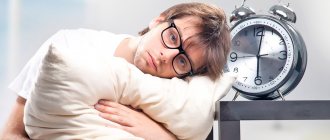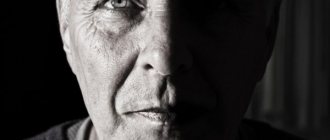Causes of the disease
Chronic insomnia can develop as a result of the following factors:
- Chronic psycho-emotional stress. Overload at work or school.
- Loud sounds, lights, strong smells. The sleep hormone - melatonin - is produced in the dark, so before going to bed you need to turn off all light sources, even the night light.
- Frequent changes of places of rest at night, disruption of the usual sleep-wake rhythm due to changes in time zones, work at night - adversely affect the body's ability to fully recover during sleep.
- An uncomfortable pillow, too soft or too hard mattress, itchy blanket, stale air in the bedroom - interfere with falling asleep and aggravate insomnia.
- Long-term use of medications that cause insomnia (psychostimulants, antidepressants, antipsychotics, corticosteroids, hormonal agents).
- Drinking caffeine-containing drinks in the afternoon (coffee, tea, especially green tea, cola). You should not forget about the stimulating effect of dark chocolate. The habit of overeating at night also provokes sleep disorders.
- Drug addiction (cocaine, LSD, nicotine, marijuana). You should not smoke cigarettes before bed, as nicotine is a stimulant.
- Endocrine diseases (thyrotoxicosis).
- Breathing pathologies (bronchial asthma, sleep apnea - spontaneous cessation of breathing for more than 20-30 seconds).
- Gastrointestinal disorders (gastroesophageal reflux - reflux of stomach contents into the esophagus, intestinal obstruction).
- Neurological diseases (senile dementia, Parkinson's disease, brain tumors).
- Consequences of traumatic brain injury.
- Joint diseases, muscle pain, restless legs syndrome (unpleasant sensations in the legs at rest, forcing you to move your legs, which interferes with falling asleep), bruxism (“teeth grinding” during sleep).
- Skin diseases accompanied by severe itching.
- Depression, anxiety, neuroses.
- Hormonal disorders (menopause).
- Hypoxia (lack of oxygen in the body).
Chronic insomnia often occurs in old age when the secretion of the sleep hormone melatonin decreases. Sleep becomes intermittent, superficial with chronic pain, with phantom pain in lost limbs after amputation. Chronic insomnia can also accompany pregnancy if the expectant mother is overly worried and constantly nervous.
An important factor in the development of chronic insomnia is anxiety caused by stress. They can also occur at an early age, provoking the development of insomnia in adolescents. People with a hot temper, excessive emotionality, and also a pronounced tendency to self-digging are susceptible to insomnia.
The causes of primary insomnia are still unknown. Secondary insomnia can be caused by the following diseases:
- chronic pain pathologies (pain interferes with proper sleep);
- heart failure associated with shortness of breath;
- COPD;
- diseases of the urinary system;
- diseases or injuries of the brain, etc.
Taking certain medications can also contribute to its development:
- alpha and beta blockers;
- respiratory drugs – theophyllines;
- decongestants;
- hormones;
- anticonvulsants;
- antidepressants;
- NPVO.
Short-term insomnia can turn into long-term under the influence of the following provoking factors: stress, anxiety, depression, worsening of the disease that caused insomnia, long-term use of benzodiazepines. After only 3 months, untreated persistent insomnia breaks away from its root cause and begins to exist as an independent pathology.
The most common reason for the transition of short-term insomnia to the long-term phase is certain psychological mechanisms: a person experiencing periodic problems with sleep develops excessive attention to the process of falling asleep, he becomes fixated on the problem of sleep and begins to worry that he will not be able to fall asleep. It is for this reason that he does not fall asleep.
The following factors can cause short-term or chronic insomnia:
- poor sleep hygiene (falling asleep late, taking stimulating/alcoholic drinks at night, etc.);
- shift work, frequent flights, other specific working conditions;
- severe or prolonged nervous tension (or simply stress);
- diseases that cause night pain or breath holding during sleep (osteochondrosis, apnea, etc.);
- III trimester of pregnancy, when a woman simply cannot take a comfortable position in sleep due to an enlarged belly;
- mental disorders.
In this regard, the question arises of how to eliminate insomnia in one case or another.
How did I identify my insomnia?
In my youth, like everyone else, I did not allow the thought of possible problems with sleep. My permanent desire to “get enough sleep” could not be broken by exams, sessions and even the feeling of emptiness in my stomach.
With age, the body began to malfunction. At first these were rare precedents. Nights when it was difficult to fall asleep occurred only a few times a year. I tossed and turned for hours after lights out, unable to let go of my thoughts. No wonder they say that insomnia is the price to pay for a rich imagination.
But the turning point was the protracted period when the maximum time for night rest was four hours. Medicines helped me fall asleep quickly, but they left unpleasant side effects. For example, the day after taking sleeping pills it was very difficult to concentrate on anything important. The general condition was sluggish, and the energy reserve tended to zero. Circles appeared under the eyes. In fact, I found myself at a crossroads: suffer from insomnia, the effect of medication, or try to solve the problem.
Factors that provoke insomnia
There are many reasons for insomnia. And it’s not always just a stuffy room and an uncomfortable bed.
Sleep disturbances can be caused by:
- Inappropriate conditions. This item includes such factors as insufficiently fresh air in the room, too low or high temperature, uncomfortable bed/mattress/pillow, distracting sounds, etc., which may interfere with falling asleep quickly and normal sleep;
- Poor breathing and snoring. If a person does not receive enough oxygen during sleep, the brain gives him a signal to wake up. The more often he wakes up, the harder it may be for him to fall asleep;
- Excited state. Excessive energy at night can be a result of taking certain types of medications, foods, and drugs. For example, well-known energy drinks or a simple cup of strong coffee can make you forget about sleep for several hours;
- Disturbed emotional background. Frequent stress, anxiety, and depression prevent the brain from relaxing, which often leads to insomnia. But, you need to understand that not only negative emotional factors can interfere with normal sleep. For example, strong surprise or joyful shock can also play a role in this matter;
- Various diseases. In most existing diseases, sleep disturbance, including insomnia, is among the possible symptoms. This is especially true for cardiac pathologies;
- Change of time zones. Flying long distances is not always just a change of scenery and new experiences, but also adaptation to a new time zone. The older the body, the more difficult it is for it to adapt;
- Poor nutrition. If breakfast must be hearty, then it is advisable to prepare dinner from easily digestible foods. In this case, the last daily meal should take place a couple of hours before bedtime, and not immediately before it. But it is important to remember that falling asleep feeling hungry is also extremely undesirable. It can also interfere with normal sleep. In this case, you can advise drinking a glass of kefir or snacking on a light green salad.
An excited state can be the cause of chronic insomnia
Before thinking about how to get rid of chronic insomnia, it is important to determine what became its true cause. It is not always possible to do this on your own correctly, so the help of a qualified specialist will definitely not be superfluous.
What really helped me with insomnia: ways to combat the disease
How did I start treatment?
First of all, I set out to normalize my daily routine using self-discipline. I promised myself to make every effort and make my life better. This promise was not easy for me, since I am a man of my word.
From that moment on, I began to gradually replace bad habits with useful actions..
Below is a list of my achievements in the fight against insomnia:
- I gave up coffee and cigarettes at night. By the way, over time I stopped smoking altogether, and I allow myself coffee (exclusively natural) in the first half of the day.
- I made dinner the easiest meal of the day. Replaced spicy and sour foods with bananas, oatmeal, cheese, and salads.
- I began to wake up at the same time, allowing the body’s internal clock to start from a certain starting point.
- She ensured maximum comfort for my sleeping place (I purchased an orthopedic mattress, as pain in the spine began to appear), began to ventilate the room before bed and sleep, if possible, with an open window.
- I started doing yoga, providing myself with regular physical activity.
It is very important to create a favorable environment before going to bed: say “no” to all problems and conflicts, stop looking for a way out of current situations.
Yoga also taught me how to manage my thoughts and use relaxation techniques.
I take a warm bath and relax
There are several opinions about when exactly is the best time to take a relaxing bath. Some say that it is recommended to take it no earlier than 2-3 hours before bedtime. Others argue that after taking this pleasant procedure, it is advisable to immediately go to bed. I believe that in searching for the answer to the question “how to cure insomnia” you need to independently understand what time is optimal. The bath should relax the body, relieve muscle tension and in no case invigorate. The water temperature should be warm, but not hot.
A homemade relaxation remedy that dealt with my tension was a pine bath. I am happy to share her recipe.
It is better to prepare it in the morning to allow the pine needles to brew. I pour 50 grams of conifer cones or needles with cold water. Then I fill them with 3 liters of boiling water. In the evening, I strain the infusion and add it to a warm bath (the water temperature after adding the infusion should not exceed 45-50 degrees). You should take such a bath only 5-7 times for 10 minutes (no more than once every 2-3 days).
A bathhouse is good for combating sleep disorders.
A broom for bath procedures is a massage tool, not an instrument of torture. Therefore, you need to disperse the heat carefully, with moderate intensity. Once a week will be enough to activate metabolic processes and after the bath you will fall asleep like a baby.
Traditional medicine: which decoction best helps you sleep?
From time immemorial, it is believed that decoctions of hop cones, heather, angelica and dandelion calm the nervous system. But what to do if such herbs cannot be purchased? There is no need to despair; in pharmacies you can always find mint, oregano, lemon balm, valerian, and motherwort.
Be sure to pay attention to the contraindications and side effects indicated in the instructions for use.
Warm milk with honey and chamomile tea are my favorite drinks before bed.
I prepare the latter as follows:
Pour 1 tablespoon of dried flowers into 300 ml of warm water and place in a water bath for 20 minutes. I strain the broth and take it an hour before bedtime.
Aromatherapy for insomnia
An equally pleasant approach to improving sleep quality has been treatment with essential oils. The aromas of lavender, lemon balm, chamomile, bergamot, rose and other essential oils contribute to overall calm. And juniper, ylang-ylang, vanilla, clary sage and incense will help you achieve deep relaxation.
It must be remembered that the room should be well ventilated before the session. The aroma should be subtle. If the oil is used for the first time, sessions should begin with 20 minutes and gradually increase to 3 hours.
Types and features of chronic insomnia
Depending on the nature of the complaints, the following types of insomnia are distinguished:
- Presomniac—difficulty falling asleep (duration of falling asleep for more than half an hour). Severe anxiety and worry about possible lack of sleep further aggravates the situation.
- Intrasomnic - frequent awakenings during the night. Superficial sleep, often with bad dreams indicating mental destabilization. Having trouble falling asleep again.
- Post-somnia - waking up too early, after which it is very difficult or impossible to fall asleep.
When all these types of insomnia occur simultaneously, the person has difficulty falling asleep, often wakes up during the night, and then again cannot fall asleep for a long time. As a result, he gets up earlier than necessary, feeling overwhelmed.
Sleep phases and modes
When a person sleeps, many processes occur in the body.
Sleep is a dynamic process and is not always the same. There are several phases that scientists have identified. They repeat in regular cycles throughout the night. The two types of sleep are REM and NREM. Slow begins with the fact that our brain, our entire body begins to work in slow motion. This species has three more phases.
Fast occurs approximately 1.5-2 hours after we fall asleep. During it, the eyes move quickly under closed eyelids. This is a period of increased activity, during which we dream, and all processes in our body accelerate. If a person is awakened during this phase, he will be able to remember them. The brain needs a lot of oxygen, so blood flow increases. Despite the acceleration of processes in the body, most of our muscles are relaxed, perhaps in order to prevent us from acting in reality the way we act in a dream.
Insomnia is the most common sleep disorder. It is defined as the inability to get enough sleep that affects our daily activities. Almost everyone experiences sleepless nights from time to time, perhaps due to stress.
Signs of insomnia:
- Difficulty falling asleep
- Frequent awakenings at night
- Early morning awakening
- Fatigue, sleepiness during the day
- Irritability
Forms of chronic insomnia
It is customary to distinguish between two main forms of insomnia: primary and secondary. Their difference is based on the causes of the disorder.
Primary insomnia is not directly related to any disorders in the body. It is provoked by various external factors, namely:
- Unsuitable sleeping conditions: uncomfortable bed, lack of fresh air, etc.;
- Change of time zones;
- Night work schedule or predominantly nocturnal lifestyle;
- Failure to adhere to healthy eating principles, including overeating or fasting at night;
- Emotional experiences and stress.
Such insomnia can be eliminated by correcting the corresponding causes.
Secondary insomnia
This type of insomnia in most cases is a consequence of diseases occurring in the body. These may be pathologists of the heart, gastrointestinal tract, central nervous system and other organs and systems. In addition, sleep disturbance can occur due to frequent waking up due to prolonged toothache or other pain, enuresis.
Secondary insomnia can also result from taking certain types of medications.
In this case, trying to look for an answer to the question of what to do for chronic insomnia is not even worth trying. Only a qualified specialist can help determine the cause of the disorder and prescribe treatment.
What is chronic insomnia
Chronic insomnia or chronic long-term insomnia is a sleep disorder that lasts longer than three to four weeks. There is a clear diagnostic criterion for diagnosing insomnia - a delay in falling asleep for more than half an hour and sleep efficiency less than 85%. Sleep efficiency in this case refers to the ratio of sleep time to the time the patient spent in bed. The patient’s opinion about his own sleep is also important. If this condition lasts longer than a month, then insomnia has entered the chronic stage.
Not diagnosed as chronic insomnia:
- circadian rhythm disorders as a result of night shift work;
- delayed sleep syndrome (delay of falling asleep by 2 hours or more from the usual time);
- voluntary deprivation syndrome.
Chronic insomnia occurs in 10-15% of people, but it is most often diagnosed in women of childbearing age, the elderly and people suffering from mental illness. May be a consequence of somatic or mental pathology. It develops after several cases of acute or short-term insomnia. The reasons for the transition of short-term insomnia to long-term insomnia can be medical, psychiatric, behavioral problems, as well as taking certain medications. Behavioral disorders are the root cause of chronic sleep disorders.
Any stressful event can become a provoking factor for the development of chronic insomnia: biological stress (exacerbation or onset of the disease); psychological (conflict at work or in the family, divorce). The onset of chronic insomnia can be triggered by events such as the birth of a baby or a flight to a different time zone.
The consequences of chronic insomnia are:
- decreased quality of life;
- chronic fatigue;
- deterioration in performance;
- mood swings;
- increased risk of suicide.
Primary or secondary
For effective treatment of chronic insomnia, it is important to correctly determine the causes of its occurrence. By origin they distinguish:
- primary insomnia resulting from personal reasons;
- secondary, resulting from psychological or somatic diseases.
Secondary insomnia is more common than primary insomnia. Since the clinical pictures are very similar, the following rule applies when diagnosing: “if symptoms persist despite the elimination of secondary causes, then treatment of primary insomnia is required.” But even in this case, there is a high risk of diagnostic error, since one patient may have several causes of the disease.
The best way to treat a disease is to identify and then eliminate the causes that led to it. When diagnosing a type of insomnia, specialized specialists are involved to identify possible somatic diseases.
Symptoms of manifestation
Chronic insomnia is characterized by exhausting fatigue and the inability to fully work.
Typical symptoms:
- complaints of poor sleep;
- concerns about taking a long time to fall asleep and frequent awakenings at night;
- deterioration of health;
- decreased performance.
Chronic insomnia may cause memory impairment and decreased mental productivity. Insomnia can cause increased physical fatigue for no apparent reason, as the body's muscles do not recover well with intermittent, shallow sleep.
Insomnia is not difficult to identify. It is signaled by fairly clear symptoms, namely:
- Difficulty falling asleep;
- Sometimes intrusive anxious thoughts;
- Shallow sleep;
- Frequent awakenings.
As a result, a person feels during the day:
- Drowsiness;
- Fatigue;
- Apathy;
- Sometimes irritability;
- Sometimes headaches and dizziness.
Daytime sleepiness is a symptom of chronic insomnia.
The longer a patient suffers from insomnia, the worse and weaker he feels during the day. He constantly feels the desire to fall asleep, but he can only do this with great difficulty.
The presence of chronic insomnia should not be ignored, as it can cause problems with study, work and simply leading a normal lifestyle.
Cognitive behavioral therapy for insomnia
Cognitive behavioral therapy (CBT) for insomnia is a set of techniques used by a psychotherapist that allows the patient to change their anxious thoughts at the subconscious level.
CBT consists of 10 -14 sessions. As a result of treatment, the patient learns:
- identify in a timely manner disturbing thoughts that interfere with sleep at night, causing anxiety and concern
- determine the significance of these thoughts, change them to more positive ones
- eliminate provoking factors before the onset of depression
- use the support of others, do not hide your worries and experiences, seek advice and help
- confidently use acquired skills in practice
Diagnostics
The diagnosis of “chronic insomnia” is made on the basis of sleep disturbances at least 3 times a week for a month or more. In some cases, medical history is supplemented by laboratory tests and polysomnography (computer recording of sleep and body reactions).
Most people, faced with insomnia, seek help from a neurologist. He can really give recommendations on how to normalize sleep. But it is worth knowing that there is also a more specialized specialist, namely a somnologist.
Diagnosis of insomnia necessarily includes a physical examination of the patient, as well as the collection of his medical history and complaints. It is important for the doctor to find out exactly how insomnia manifests itself and what immediately preceded it. During prima, various examination methods, such as the Epworth scale, can be used. It is formed based on the patient’s answers to certain questions and demonstrates the degree of his daytime sleepiness.
For a deeper diagnosis of the problem, a polysomnographic study can be used. It involves assessing the patient's condition while he sleeps. For this purpose, special equipment based on electrodes is used.
Bottom line
Of course, if you have any serious illnesses. First we need to start treating them. Well, all the recommendations in any case will not be superfluous for a good night’s sleep.
We all know these simple rules, but we often neglect them. For which we immediately get a sleepless night. I cured her by remembering the basics of good sleep. And I didn't need any pills.
By following these accessible recommendations, we will not only forget about being awake at night, but also improve our overall well-being.
At A.S. Pushkin has a wonderful work on the topic of insomnia.
And the greats of this world fall into the tenacious clutches of this lady.
Treatment options
It is worth understanding that there is no universal advice on how to cure chronic insomnia. Therapy is selected based on the patient's examination results. In general, ways to normalize sleep can be found in both traditional and folk medicine.
Medication
Eliminating insomnia with the help of medications is the simplest solution to the problem, but at the same time it requires the most responsible approach. Selecting such medications on your own is strictly prohibited. The type of drug and its dosage are prescribed by the attending physician.
Some effective medications for insomnia include:
- Sleeping pills. Their range is very wide; there are both plant-based and synthetic options. The correct dosage of sleeping pills and their duration of use are very important;
- Tranquilizers and other sedatives. They have a depressing effect on the cerebral cortex, which is responsible for the emotional state. This achieves a calming effect;
- Antidepressants. Their mechanism of action is the opposite of sedatives. In this case, the active substances stimulate the cerebral cortex, increasing the body’s performance and improving mood;
- Preparations containing the hormone melatonin. A synthetic analogue of the hormone is prescribed in case of insufficient production of the hormone by the body itself. It has a chronobiological effect.
Antidepressants are used to treat chronic insomnia.
Since sleeping pills can be addictive and in most cases have side effects, they should be prescribed exclusively by a doctor.
Traditional methods
In the struggle for healthy sleep, people often turn to traditional medicine for help. In this case, it is important to remember that such methods can only act as additional therapy and also require a careful approach, because most natural components can provoke an allergic reaction.
The following can help cure chronic insomnia:
- Honey water. A glass of warm water with a spoonful of honey diluted in it perfectly relaxes the body. Alternatively, honey can be added to tea;
- Valerian. This plant is widely known for its sedative effect. Crushed valerian root is brewed with boiling water and left for about 4 hours;
- Hop cones. An effective remedy for insomnia. It is enough to steep a couple of cones in boiling water and drink the resulting product warm at night;
- Dill seeds. A simple, affordable treatment option for insomnia. The seeds are simmered in Cahors for about an hour. Proportions – 2 tablespoons per 500 milliliters.
With the proper combination of traditional methods of treatment and folk recipes, you can quickly eliminate the signs of insomnia.
What to do
Treatment for chronic insomnia depends on the severity of the disease. In some cases, it will be enough to adjust your sleep schedule and hygiene, and apply psychotherapeutic techniques. If the situation is advanced, then you cannot do without drug treatment.
For secondary insomnia, the underlying somatic disease is treated. Usually everything gets better after the provoking factor is eliminated.
Drug treatment
To treat chronic insomnia, serious drugs are used that affect the central nervous system.
Simple sedatives such as Novopassit or Persen are powerless here.
The following medications are prescribed:
- Sleeping pills of the benzodiazepine group: Flurazepam. Reduces the time it takes to fall asleep, prevents night awakenings, improves the depth of sleep, and prevents nightmares. Use 15 mg before going to sleep for a week.
- Barbiturates: Cyclobarbetal. Reduces brain activity and has a strong sedative effect. Drink 200 mg half an hour before bedtime.
- New generation sleeping pills: Somnol. Promotes quick fall asleep, deep sleep, and prevents the feeling of weakness in the morning. This drug does not cause daytime drowsiness or lethargy, and therefore does not interfere with driving. Take 8 mg in the evening.
The above remedies should not be taken for more than a week to avoid the development of addiction. Medicines are available only by prescription, self-medication is prohibited.
There are also medications that do not require a prescription. They act more gently and are not addictive. After stopping treatment, there is no withdrawal syndrome.
These drugs can be taken together with others or as stand-alone drugs:
- Melaxen. Made with melatonin. Normalizes the cycle of rest and wakefulness without changing the structure of sleep. Take 3 mg per half hour before falling asleep.
- Glycine. Regulates the processes of excitation and inhibition in the nervous system, relieves emotional stress, and facilitates falling asleep. One tablet is placed under the tongue before bedtime.
Other therapies
In addition to drug therapy, other methods are used to treat insomnia:
Improving sleep hygiene. Consists in choosing the right mattress, pillow, bed linen
It is important to adjust the temperature in the room and ventilate the room in the evening. Clothing should be made from natural fabrics and loose.
Adjusting your daily routine
It is necessary to plan your rest and wakefulness regime so that you have at least 8 hours of rest. Before going to bed, you should not drink tonic drinks, play computer games, or watch emotional films. You can take a warm bath, drink tea with mint or lemon balm.
Psychotherapy. They use relaxing techniques, cognitive therapy, and conversations with a psychologist. The patient is recommended to keep a sleep diary, noting the experiences and emotions that he experiences during the day. Based on observations, the doctor will be able to understand the causes of the disorders.
Electrosleep. Special sensors are connected to the patient’s head, which affect the brain and create a semblance of sleep, which promotes relaxation. After a course of such therapy, the patient’s condition normalizes.
Sleepy pillows
Herbal pillows for insomnia
Make sleepy pillows and place them at the head of your bed. It will be uncomfortable to sleep on them, and it is not necessary, but they will do their job, emitting a pleasant herbal aroma.
Pillow 1 . One glass of hop cones, a bag of bay leaves, three glasses of dry fern leaves. Pillow 2 . One glass of wormwood, two of hop cones, one of thyme. Pillow 3 . You will need some herbs in your pillowcase for this pillow. Take equally: chamomile, primrose, St. John's wort, heather, buckthorn, hop cones, white clover and acacia, sweet clover, lemon balm and mint, agrimony. Sew one of the herbal mixtures into a small pillowcase and keep it next to you in bed. And sleep will not keep you waiting.
Three bags
For this remedy you need to take twenty horse chestnuts. Divide them into three parts and place them in three fabric bags. Tie them up and hang them under your bed. At the head, in the middle and at the feet. Let them hang and give you good dreams. No one can explain how this works. But the fact that it works is for sure!
Clay cakes
Mix pharmaceutical clay powder with a small amount of yogurt until a thick paste is formed. Place the paste on a cloth, add another layer of cloth on top and place it on your forehead for half an hour before going to bed. Do this procedure every other day and very soon your sleep will return to normal.
Oil rubs
Before going to bed, massage the occipital fossa, palms and heels with vegetable oil. Traditional healers claim that this is a very effective remedy.
Water treatments
Cool sitz baths can help you fall asleep
Every evening, take a sitz bath for five to seven minutes, but the water should be warm, not hot. Lower the temperature of the water daily and bring it to cool. The mechanism of action of the baths is simple. Being in cool water, you cool down slightly, and when you lie down under the blanket, you begin to warm up. The warmth spreading throughout your body pleasantly soothes you and you fall asleep.
It is useful for insomnia to wash your feet with a cold shower before going to bed. Then rub them and go to bed. Works the same as a cool bath.
Exercises for insomnia
Relax while lying on your back. At a slow pace, connect and separate the thumb and index fingers of both hands. 15-20 times and you will feel that sleep is on the way.
A set of exercises that need to be performed while lying in bed when you have already gone to bed. Exercise 1 . Take a deep breath and push your chest forward as far as you can. Exhale - relax. Repeat 15 times. Exercise 2 . Inhale while simultaneously curling your toes forward. As you exhale, relax. Repeat 10 times. Exercise 3 . As you inhale, clench your hands tightly into fists, while straining your entire arm. Relax as you exhale. Repeat 15 times. After this complex, sleep does not linger behind the headboard.
We are sure that our tips will help you overcome insomnia.
What can cause insomnia?
Nervous overexcitation is one of the causes of human suffering at night. Mental and physical fatigue can also cause insomnia. Diseases, for example, those associated with poor circulation, accompanied by bouts of coughing or shortness of breath, can deprive a person of sleep. In this case, you need the help of a doctor to eliminate the cause. But there are cases of insomnia in people who do a lot of mental work. At the same time, they do not think about the length of the working day. They can work almost around the clock and, to invigorate themselves, drink a lot of black coffee or strong tea. In this case, you need to force yourself to limit your working day and devote the evening to relaxation. You can try some of what alternative medicine offers us.
What causes insomnia
Insomnia in old age
Elderly people are more likely to experience sleep disturbances. This is due to poor circulation and decreased melatonin levels. This problem is mainly solved by taking medications.
Important information
The main condition for treating patients at this age is the minimal risk of complications or side effects when using certain drugs.
In addition, to successfully get rid of insomnia, you need to adhere to a number of recommendations, including:
- comfortable bed with linen made from natural materials;
- avoiding stress;
- exclusion from the diet of fatty and fried foods, tea, coffee;
- regular ventilation of the living space;
- walks in the open air.
Insomnia, what to do to fall asleep. How to quickly fall asleep and stay asleep
Hypnotic? No! This is a bad idea and not our choice.
You should find natural, natural techniques for getting ready for bed and falling asleep.
Undoubtedly, it is easier with a tablet. Take a sip, 15 minutes and you are in the kingdom of Morpheus. But simpler is not always better.
Neurologists do not recommend using sleeping pills on a regular basis.
Addiction occurs, requiring increasing dosages over time.
there are side effects.
If you fall asleep easily, you will not feel refreshed the next day. Will you be haunted by the weakness and drowsiness of Article 3? url. To defeat it, you will have to rely on coffee in increased doses, which is not always beneficial and not for everyone. Free 4 tbsp. 7. And later you will have to overcome the effects of caffeine. This creates a vicious circle
Sleep should not be synthetic, but natural. It makes sense and should be fought for.
We will offer you several life hacks to help you
Method 1
"Visualization"
a) Give your full attention to the relaxation process.
- Relax your facial muscles and neck.
- Release your lower jaw.
- Drop your shoulders.
- Follow your eyes along your hands. Feel the warmth and relaxation in one, then in the other.
- Pass a relaxing wave through your chest, stomach, thighs, legs, all the way down to your toes.
- Repeat if necessary, controlling softness and relaxation. Feel that you yourself are, as it were, spreading in space.
b) Let's move on to visualization.
Choose one of the proposed options, experimenting with each or the one that immediately seemed closest to you. Or, having understood the essence, choose your personal, unique option
This technique will help you move away from thoughts that bother you and focus on the process of presentation.
Option 1
Imagine:
- Lake.
- Water lilies.
- Quiet water.
- You are lying in a boat.
- Clear blue sky.
Observe this whole picture and your feelings.
Option 2
Imagine a dark room. Soft cozy sofa. Lie down in a ball. Make yourself comfortable. Nothing bothers you, it’s warm, calm, pleasant. Rest.
Option 3
Visualization of a dynamic picture
It helps many people fall asleep in 1 minute.
Its essence is to occupy the brain by observing monotonous events, it begins to get bored and falls asleep.
Imagine an inflatable ball bobbing on the waves of the ocean, and how circles radiate from it. Keep an eye on them. Watch them further, further.
Method 2
"Seeing Blind"
- Relax as suggested above.
- Close your eyes.
- Start peering into the darkness, patterns, geometric shapes appearing before your eyes, various shapes and outlines, and so on until “cartoons” appear.
Method 3
"Sound files"
You can easily find these on the Internet. Try using them during the day, after deciding to rest, to see if they are effective.
Use “white noise”, special relaxation programs with the sounds of nature, waterfalls, the sea, whatever you like best.
Relax. Get rid of thoughts and relax.
Method 4
"Special Forces"
It is used by special forces who are short on time, but also need restorative sleep.
There is an opinion that this is the easiest way to fall asleep in 1 minute.
Lie down, relax, roll your eyes up. The brain will begin to send the signals necessary to the body, and sleep will begin.












